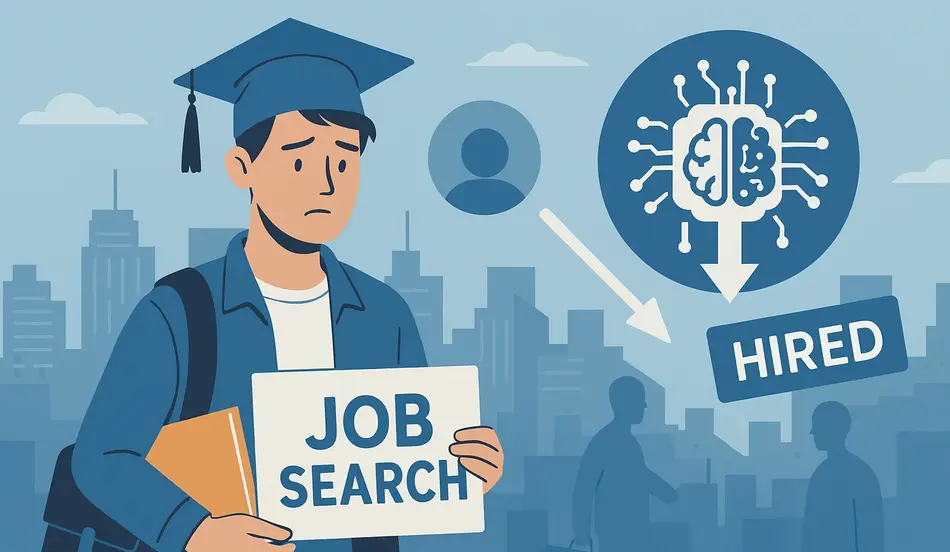The Gen Z job crisis is reshaping the employment landscape for new graduates. As artificial intelligence (AI) and automation transform industries, many young professionals are facing unprecedented challenges in finding entry-level positions and building sustainable careers. In this comprehensive guide, we’ll explore how Gen Z can navigate AI disruption, adapt to the knowledge economy, and develop the skills needed to thrive in a rapidly changing world.
Understanding the Gen Z Job Crisis
For many Gen Z graduates, the transition from education to employment has never been more daunting. The rise of AI-powered tools and automation has led to a reduction in traditional entry-level roles, making it harder for new entrants to gain a foothold in their chosen fields. According to a recent World Economic Forum report, nearly 40% of entry-level jobs are at risk of automation by 2030. This shift is forcing graduates to rethink their career strategies and focus on skills that are less susceptible to automation.
Entry-Level Job Challenges in the Age of AI
Entry-level positions have traditionally served as stepping stones for young professionals. However, with AI systems now capable of handling administrative tasks, data analysis, and even customer service, many of these roles are disappearing. This trend is particularly evident in sectors like finance, marketing, and retail. As a result, Gen Z graduates must be proactive in seeking opportunities that leverage uniquely human skills such as creativity, emotional intelligence, and complex problem-solving.
The Knowledge Economy and Its Impact on Gen Z
The global economy is rapidly transitioning from a manufacturing-based model to a knowledge-driven one. In this new landscape, employers value candidates who can demonstrate adaptability, digital literacy, and a willingness to learn. Gen Z graduates who invest in continuous learning and upskilling are better positioned to succeed. Platforms like Coursera offer a wide range of courses that can help young professionals stay ahead of the curve.
Developing In-Demand Skills for the Future
To overcome the Gen Z job crisis, graduates should focus on building a diverse skill set that includes both technical and soft skills. Technical skills such as coding, data analysis, and digital marketing are highly sought after, while soft skills like communication, teamwork, and adaptability remain essential. WhatJobs offers a variety of resources to help you identify and develop these skills.
Networking and Building Professional Relationships
Networking remains a powerful tool for career advancement, especially in a competitive job market. Gen Z graduates should leverage social media platforms like LinkedIn to connect with industry professionals, join relevant groups, and participate in virtual events. Building a strong professional network can open doors to job opportunities, mentorship, and valuable insights.
Adopting a Lifelong Learning Mindset
In a world where technology is constantly evolving, a commitment to lifelong learning is crucial. Gen Z graduates should embrace new challenges, seek feedback, and remain open to acquiring new knowledge. This mindset not only enhances employability but also fosters personal growth and resilience.
Practical Advice for New Graduates
While the Gen Z job crisis presents significant obstacles, there are practical steps graduates can take to improve their prospects. Tailor your resume to highlight relevant skills and experiences, prepare thoroughly for interviews, and consider internships or volunteer work to gain hands-on experience. Don’t hesitate to seek guidance from career counselors or industry mentors. Remember, persistence and adaptability are key to overcoming setbacks and achieving long-term success.
FAQs: Gen Z Job Crisis
What is the Gen Z job crisis?
The Gen Z job crisis refers to the unique employment challenges faced by new graduates due to AI disruption, automation, and a rapidly changing economy.
How is AI affecting entry-level jobs for Gen Z?
AI is automating many entry-level tasks, reducing the number of traditional roles available and requiring graduates to develop new, in-demand skills.
What skills should Gen Z focus on to succeed?
Gen Z should focus on both technical skills like coding and data analysis, as well as soft skills such as communication, adaptability, and problem-solving.
How can Gen Z graduates build a professional network?
Graduates can use platforms like LinkedIn, attend virtual events, and join industry groups to connect with professionals and expand their network.
Where can Gen Z find resources to navigate the job crisis?
Websites like WhatJobs offer career advice, job listings, and skill development resources tailored to the needs of Gen Z graduates.
A Gen Z Graduate’s Journey
Meet Priya, a recent computer science graduate facing the Gen Z job crisis. After struggling to find a traditional entry-level role, Priya decided to upskill by taking online courses in AI and data analytics. She also joined several LinkedIn groups and attended virtual networking events, which helped her connect with industry professionals. Through persistence and continuous learning, Priya landed a remote internship at a tech startup, where she now applies her skills in real-world projects. Priya’s story demonstrates that with the right mindset and proactive approach, Gen Z graduates can overcome the challenges of AI disruption and build successful careers in the new economy.
For more insights and job opportunities, visit WhatJobs today.




